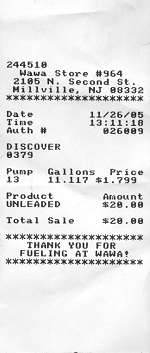- By Dan Veaner
- News
 Print
Print Please note the date and the location. This is news. News which should beg the question WHY!!!"
Why indeed! This represents a big difference of at least 50 cents per gallon. The Department of Energy says there are several factors that affect price. The proximity of the supply, disruptions in the supply, local competition, environmental programs and local station operating costs gas station owners incur all affect what you will pay at the pump.
 Gas ReceiptMillville, where Mr. Sharpless got his gas, is in Southern New Jersey. It is about 145 miles from New York City, and 45 miles from Philadelphia. It is about 8% rural, 10% residential, with 61% vacant land. Their population is actually about twice that of Lansing, and their land area is ten times that of the Town of Lansing. You would expect gas prices to be about the same or more expensive in Millville than here. But population density and land area aren't the only factor that effects gas prices.
Gas ReceiptMillville, where Mr. Sharpless got his gas, is in Southern New Jersey. It is about 145 miles from New York City, and 45 miles from Philadelphia. It is about 8% rural, 10% residential, with 61% vacant land. Their population is actually about twice that of Lansing, and their land area is ten times that of the Town of Lansing. You would expect gas prices to be about the same or more expensive in Millville than here. But population density and land area aren't the only factor that effects gas prices.The DOE's web site notes "Nineteen States have passed legislation to restrict the use of the gasoline additive MTBE, but of these, only California, Connecticut, Kentucky, Missouri, and New York relied on the additive to begin with. MTBE removal requires large changes to gasoline production and distribution. California faced temporary supply dislocations and price volatility during the summer of 2003 as MTBE was removed from gasoline in the State. Other states may face similar issues as they make the transition to gasoline without MTBE."
This may account for part of the discrepancy between the New Jersey gas station and those in Lansing. But the big part is taxes. According to the American Petroleum Institute in a 2005 breakdown, New york has the highest gas taxes in the country. Total state gas taxes are 44.5 cents, while New Jersey only taxes 14.5 cents per gallon. When you add Federal taxes, New Yorkers end up paying $0.62.9 while in New Jersey you would pay $0.32.9.
Mr. Sharpless purchased 11.117 gallons of gas. In New York that means $6.99 in taxes. In New Jersey it only comes to $3.66. That accounts for $3.33 or about 30 cents per gallon of the difference. This difference of State taxes accounts for 60% of the higher price in Lansing.
That leaves 40% that must be accounted for by local and environmental conditions. There is little we can do about those, but that 60% can be addressed by contacting our State representatives and demanding to know why our taxes are so high and what they will do to provide relief. Evidently that is where the news is -- it is no secret that New York taxes are high, and this is a way that it impacts our pocket books every day.
----
v1i20



